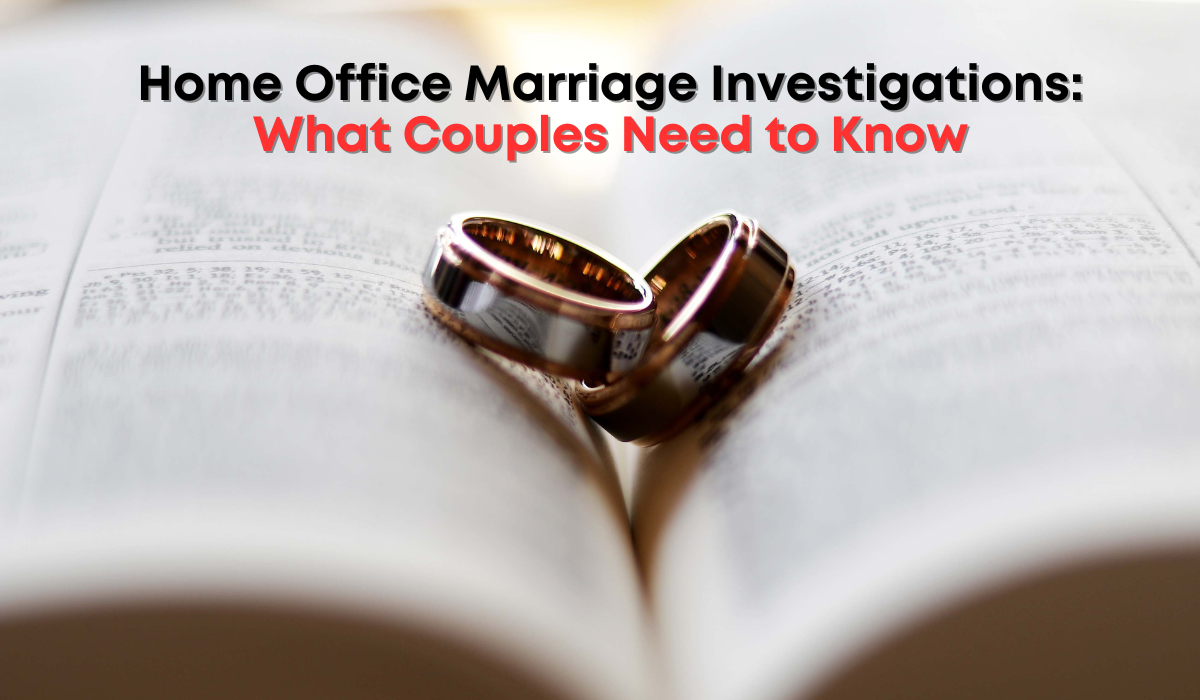The Legal Foundation: Why Marriage Investigations Exist
Under the Immigration Act 2014, measures were introduced to combat so-called “sham marriages”—marriages or civil partnerships entered into for immigration advantage rather than genuine commitment. At the core of these measures is a referral and investigation scheme that grants the Home Office powers to scrutinise certain proposed unions.
When couples give formal notice of their intention to marry or enter a civil partnership, registration authorities are required to refer the details to the Home Secretary under specified conditions.
Who Is Referred for Investigation?
The legislation sets clear criteria for referrals. Proposed marriages or civil partnerships are referred to the Home Office where one or both parties are not exempt persons. Exempt persons include:
- British or Irish citizens,
- Individuals with status under the EU Settlement Scheme or pending appeals made before 1 July 2021,
- Persons with settled status or valid visas for marriage purposes, such as fiancé(e) or civil partnership visitor visas,
- Individuals exempt from immigration control.
Once a referral is made, the Home Office decides whether to investigate. If an investigation is launched, the standard 28-day notice period is extended to 70 days to allow for scrutiny.
Section 48 of the 2014 Act dictates that two conditions must be satisfied for an investigation to proceed:
- The Home Secretary must confirm that at least one party is not exempt.
- There must be reasonable grounds for suspecting the proposed marriage or civil partnership is a sham.
Defining Sham Marriages: The Home Office’s Risk Factors
The Home Secretary has published statutory guidance detailing “risk factors” that might indicate a sham marriage. These factors do not automatically confirm wrongdoing but serve as red flags prompting further examination. Common risk factors include:
- Either party is an immigration overstayer, absconder, or has breached visa conditions.
- One or both individuals entered the UK illegally or were previously removed.
- Criminal convictions or other connections to illegal activity exist.
- Either party has been subject to a section 24/24A report (related to sham marriages under the Immigration Act 1999).
- A history of obtaining immigration status through deception or fraudulent documents.
- Evidence of ongoing or previous immigration applications tied to other partners.
While these factors raise suspicion, trained decision-makers must carefully assess all available information to ensure fair outcomes.
The Investigation Process: What Happens Next?
Once the Home Secretary decides to investigate, the parties are formally notified. This notice triggers a series of steps that may include:
- Providing Information: The couple may be asked to submit details about their relationship, shared living arrangements, and future plans.
- Contacting the Home Office: Couples must contact officials within a specified timeframe to arrange interviews or clarify requested details.
- Attending Interviews: Investigative interviews may be conducted in person at a Home Office facility, at the couple’s home, or remotely via phone or video.
- Document Submissions: Couples may need to provide supporting evidence, including photographs and relationship history.
Throughout the investigation, couples are legally obligated to update the Home Office regarding any changes in their usual address or contact details—particularly if they leave the UK during the process.
Compliance Is Non-Negotiable
During a marriage investigation, compliance is paramount. Failure to adhere to requirements can lead to a compliance decision that prevents the proposed marriage or civil partnership from proceeding. Non-compliance includes:
- Failure to attend scheduled interviews without reasonable cause.
- Refusal to provide requested documents.
- Failure to update addresses or contact information.
While non-compliance does not automatically indicate a sham marriage, it can cast serious doubt on the genuineness of the relationship. In exceptional cases, a reasonable excuse—such as compelling compassionate grounds or Home Office administrative error—may be accepted.
The Home Office’s guidance stresses that decision-makers must weigh the overall evidence, particularly when documents or interviews are unavailable but would not fundamentally change the outcome of the investigation.
The Consequences of Non-Compliance
If couples are found to have failed the investigation, they cannot proceed with their proposed marriage or civil partnership under the original notice. However, this does not permanently bar them from reapplying.
More serious consequences arise when a relationship is determined to be a sham. These include:
- Refusal of immigration applications,
- Cancellation of existing leave,
- Potential enforcement action, including deportation,
- Criminal liability for those knowingly participating in a sham marriage.
Such outcomes can be life-changing, underscoring the importance of legal compliance and the need for expert legal advice when navigating the investigation process.
Beyond the 2014 Act: Other Investigations into Relationships
It’s worth noting that not all investigations into the genuineness of relationships occur under the Immigration Act 2014. The Home Office retains the discretion to investigate marriages or partnerships outside this formal scheme. For example:
- Investigations may arise following an immigration application,
- Home Office intelligence or enforcement operations may prompt action,
- Criminal investigations into sham marriages may involve unannounced visits to couples’ homes.
These non-scheme investigations operate outside the stricter procedural safeguards of the 2014 Act, often making them more intrusive and unpredictable.
Key Takeaways
The Home Office’s power to investigate proposed marriages and civil partnerships under the Immigration Act 2014 serves as a key tool in preventing immigration abuse. For couples referred for investigation, strict compliance with Home Office requirements is crucial to avoiding delays or adverse outcomes.
While the investigation process can feel invasive and complex, couples must recognise its importance in ensuring the integrity of the UK’s immigration system. For those facing investigations, seeking expert legal advice early on can help mitigate risks, safeguard genuine relationships, and ensure compliance with Home Office obligations.
Ultimately, understanding the process and proactively engaging with Home Office requirements can ensure a smoother path for couples seeking to formalise their relationships in the UK.
Get in touch: For a comprehensive understanding of your options or queries on UK immigration matters, contact GigaLegal Solicitors at 02074067654 or click here to book a no-obligation consultation with an immigration expert.


